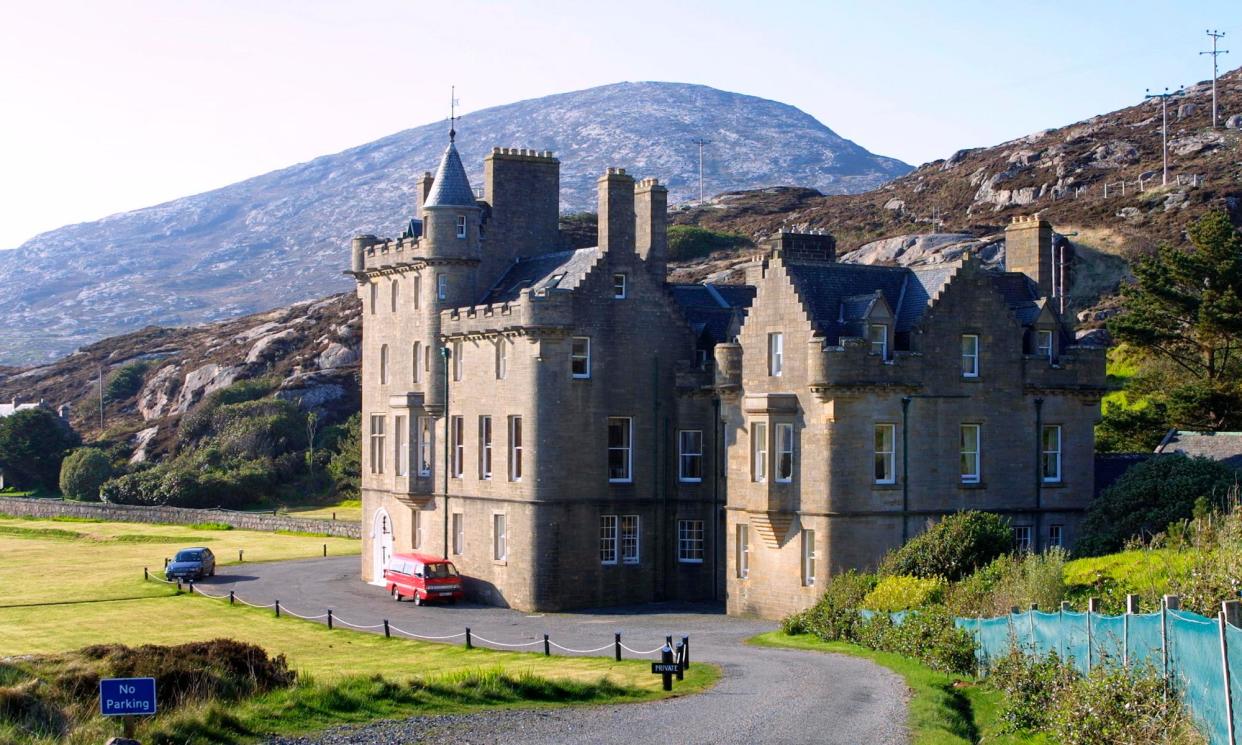An t-Eilean: £1m-an-episode drama to bring Outer Hebrides to global audience

The tranquility of a remote castle in the Outer Hebrides, with its views of long golden beaches, rocky coasts and glowering skies, is about to be shattered by the staging of a woman’s murder.
Detectives will fly in from Inverness. The drama will catapult the castle and this secluded Gaelic-speaking corner of Harris to a global audience, as a dysfunctional family’s long-buried secrets emerge.
Amhuinnsuidhe Castle, a Scots baronial mansion built in 1867 overlooking the tiny island of Taransay, has been chosen as the setting for what may be television’s first Gaelic blockbuster.
Filming begins there next week for the most expensive drama made in Scots Gaelic, a £1m-an-episode, four-part thriller. An t-Eilean, or The Island, tells the story of a wealthy family torn apart by tensions seeded during a Hogmanay party 10 years ago.
Its backers, including the BBC, hope the show will share in the global success of other recent minority-language productions from Wales, Ireland and the Faroes.
The Oscar nomination for The Quiet Girl (An Cailín Ciúin) last year, the first for an Irish-language production; the ratings triumphs for the Welsh-language series Keeping Faith (Un Bore Mercher) and Hinterland (Y Gwyll); and the breakthrough Faroese thriller Trom have all prepared the ground. An t-Eilean’s director is Tomás Ó Súilleabháin, who made the Irish-language film Arracht.
Related: Irish film Arracht eschews Brit bashing to tackle famine taboo
Thanks to global streaming channels such as Netflix, modern audiences are much more comfortable with foreign-language productions and box set binges. Younger viewers, brought up on TikTok and YouTube, habitually use subtitles.
These trends have upended the old model for television commissioning, says Bill Macleod, a commissioning editor with BBC Alba, the corporation’s Gaelic service. A boon for minority languages, the trends amplify the new show’s kinship with Shetland, the hit detective series set in Shetland based on Ann Cleeves’s bestsellers, which lingers over its brooding landscapes.
An t-Eilean, a co-production between the Glasgow-based company Black Camel Pictures, MG Alba, the Gaelic broadcasting agency, and the funding body Screen Scotland, has already had offers from Sweden, Denmark, Germany and Belgium, partly due to the work of its other backer, the US-owned distributor All3Media.
“There is a lot of international intrigue and excitement around Gaelic culture and the Hebrides, and we definitely felt that in the market,” says Arabella Page Croft, whose firm, Black Camel, originated the idea for An t-Eilean.
She says that confidence led the producers to decide to shoot it mostly in Gaelic; English dialogue will make up about 30% of the script. “My teenage kids watch everything with subtitles – thank you TikTok.”
Nevertheless, the commissioning of An t-Eilean has highlighted a crisis affecting Gaelic broadcasting, which campaigners believe feeds into the startling decline of Scots Gaelic as a living language.
John Morrison, the chair of MG Alba, a quango funded by the Scottish government, says Gaelic broadcasting has been starved of money. The “orphan” of British broadcasting, it has been slowly withering, he says.
Unlike the programme-making overseen by the Welsh-language broadcaster S4C, Gaelic television and radio has much weaker statutory provisions and no legal guarantee of funding.
Although BBC Alba provides it with an additional £10m a year worth of productions and free access to iPlayer, MG Alba’s core funding has remained at £13m a year for a decade, while inflation has soared. Morrison estimates that by 2027 its grant will be worth half what it was when MG Alba was set up.
By contrast, S4C’s funding increases with inflation. It also received £7.5m from the UK government to support the move to digital streaming; MG Alba received nothing. MG Alba once made 500 hours of original programming each year; it can now only afford to make 350 hours. Its part-funding of An t-Eilean has used up its full drama budget for the year.
This battle has reached the House of Lords where the former Tory minister Andrew Dunlop has tabled amendments with cross-party support to the new media bill, attempting to give Gaelic the same statutory footing as S4C. Culture ministers have rejected similar amendments in the Commons.
Macleod says new UK government tax breaks for shows that cost more than £1m an hour to produce helped to make An t-Eilean financially viable. But commissions of that scale are very rare. “We hope that this will be a step change, although the alchemy of putting together a project like this is difficult to repeat,” he says.
Given the effective cuts to its funding, Morrison fears Gaelic broadcasting faces the same crises as Gaelic community development: Aberdeen University has heavily cut Gaelic languages degrees because too few students were applying; 27 Gaelic development jobs were only saved last week with emergency funding.
“We want the UK parliament to treat the two Celtic languages of the country in the same way,” Morrison says. “Gaelic needs equity and fairness. Look at how S4C has helped grow the number of Welsh speakers over the last 40 years. We want the same growth for Gaelic.”
A spokesperson for the UK government’s Department for Culture, Media and Sport said ministers were considering possible changes to the funding of Gaelic broadcasting as part of its reviews of the BBC’s charter and its funding.
The media bill will prioritise minority-language broadcasting on streaming services and add minority languages to the UK’s public service broadcasting remit. That would boost Gaelic programming and increase commissions, the spokesperson said. “We recognise the value of minority-language broadcasting for Gaelic speakers across Scotland and the rest of the UK,” they added.


